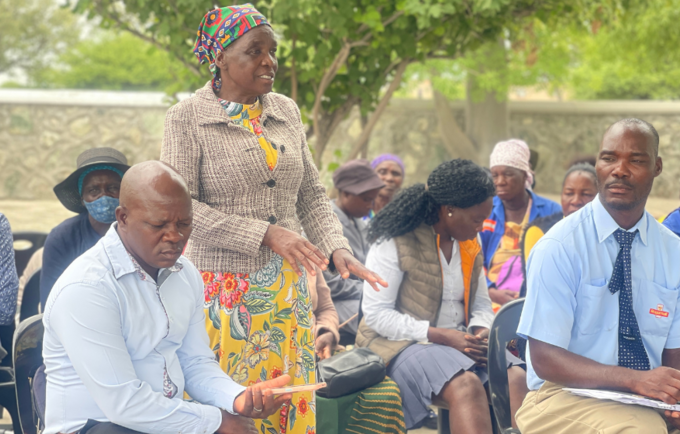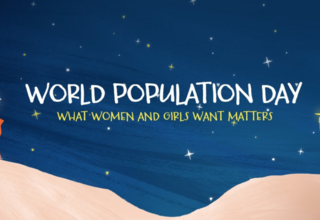GABORONE, Botswana- "There is a need for extensive public education for better understanding the significance of obtaining national identity cards as well as registering both births and deaths. Since the majority of people in this region lack formal education, they do not comprehend the significance or benefits of registering,” said Ms. Keatlaretse Gabatsholwe, a resident of Gumare village during community consultations, pleading with the Department of Civil and National Registration officials to bring this education to every Motswana, even those in difficult-to-reach places.
Civil Registration and Vital Statistics (CRVS) is an essential data collection system for countries that captures vital events including births and deaths, and therefore a critical enabler of access to services and participation in civic life for everyone. Vital statistics from registration records are also useful for government policy and planning purposes, and such data are directly related to the achievement of several United Nations Sustainable Development Goals. However, many people, particularly in hard-to-reach areas and other marginalized communities, face unique barriers to accessing civil registration systems including distance, cost, and regulations that place demands on them for documentation.
UNFPA has partnered with the Department of Civil and National Registration to augment the capacities of the CRVS to capture all vital events occurring within Botswana. One of the focus areas for this collaboration is the implementation progress review of the CRVS Strategic Plan 2016-2020 and a comprehensive assessment of the CRVS. The evidence generated is expected to be used to inform the development of a new CRVS Strategic Plan for the country.
As part of this comprehensive assessment, community and stakeholder consultations were conducted throughout the country in over twenty villages including Xhumo, Toromoja, Mababe, Gumare, Seronga, Beetsha, Gudigwa, Hukuntsi, Hunhukwe, New Xade, Ghanzi, Charles Hill, Lerala, Selebi Phikwe, Francistown, Matshelagabedi, Matsiloje, Nata, Dukwi, and Letlhakeng. The consultations identified gaps and challenges, as well as lessons learned and best practices for consideration in the development of the new plan.
“This strategic focus on the CRVS is expected to identify best practices for scale up, system capacity gaps for strengthening while also focusing on facilitating the use of administrative data for development planning, including tracking progress pertaining to implementation of the SDG agenda,” said Ms. Boago Makatane, UNFPA’s Strategic Information Specialist.
She added that a well operating CRVS system helps safeguard people's rights and benefits, such as their access to health care, education, social protection, and other public services.
Specifically for women and girls, civil registration is especially crucial because it establishes a foundation for tackling gender inequality, which is exacerbated by lack of identity. Without identification, girls are more likely to be married off young, forcibly, or as children; without a marriage license, women run the risk of losing their inheritance, their parental rights, and their access to basic rights. Without a divorce certificate, there is no legal foundation for dividing up shared assets or parenting duties after a marriage.
Additionally, the creation of national and local policies, the monitoring and assessment of development outcomes, and particularly the analysis of ensuring that no one is left behind depend heavily on precise and comprehensive vital statistics that are obtained from civil registration records. To create, execute, and monitor public health programs as well as identify emergent health problems, such as COVID-19, timely statistics broken down by causes of death and other demographic traits are essential, and a strong CRVS is vital in this regard.
The United Nations Sustainable Development Goals (SDGs) must be achieved across the world during the next seven years, and in order to make the necessary progress, data from the CRVS systems must be reliable and up-to-date.
“We must constantly remind ourselves that SDGs use indicators that call on reliable CRVS data. As a result, CRVS is a powerful instrument for tracking the nation's progress toward 2030 as well as an accelerator for the attainment of SDGs,” continues Ms. Makatane.
UNFPA is committed to support the Government of Botswana to speed up the process of change towards a modern and progressive CRVS system in which data including vital statistics will be shared and used for the formulation and implementation of evidence-based policies and decision-making.
“It is an honor for UNFPA to assist the Government of Botswana in hastening the transition to a cutting-edge and innovative CRVS system where information, especially crucial statistics, will be shared and used to develop and carry out evidence-based policies and decision-making,” she added.
As the deadline for the Sustainable Development Goals draws nearer, Ms. Makatane says, "We are fully committed to continuing our strong partnership to have a robust CRVS system that ensures every woman and girl is counted and protected throughout their lifetime and our collective vision of ensuring that no one is left behind."


